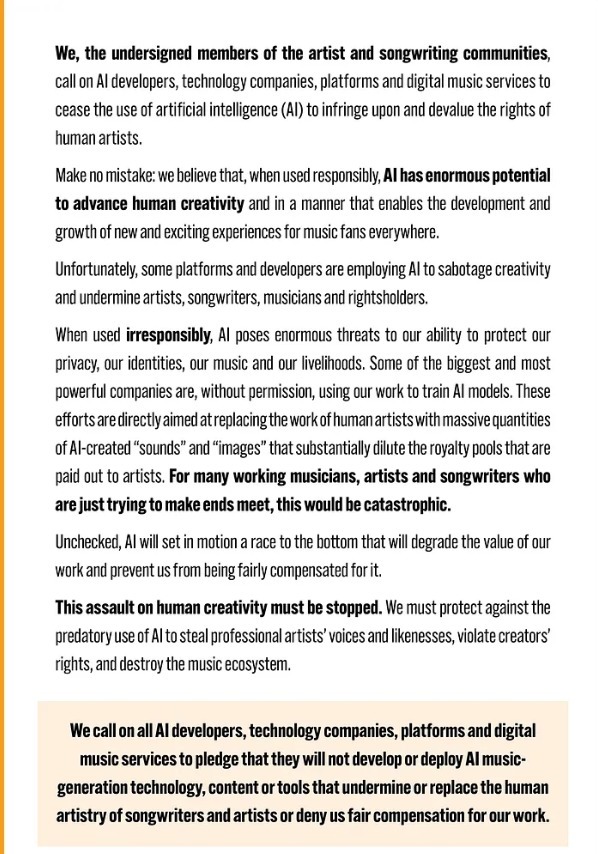In a groundbreaking move, over 200 internationally acclaimed musicians, including Billie Eilish and Nicki Minaj, have issued a public outcry against the misuse of Artificial Intelligence (AI) in the music industry. Their open letter, dated April 2nd, has sparked a global conversation about the ethical use of AI in creative spaces.

Photo/the Artist Rights Alliance
The letter comes as a response to the increasing use of AI in generating music that mimics the style and voice of human artists, raising concerns over copyright infringement and the devaluation of human creativity. The signatories, many of whom are Grammy and Oscar winners, argue that while AI has the potential to enhance human creativity and push the industry forward, its irresponsible use threatens the livelihood of artists, songwriters, and copyright owners.
The collective voice of these artists resonates with the sentiment that AI should not be used to undermine the rights and earnings of human creators. The letter emphasizes the need for responsible AI usage that respects the creative chain and the ecosystem of the music industry.
The issue is not confined to the international arena; it’s equally prevalent in China, where AI renditions of songs using the voices of popular singers have become increasingly common. Last year, AI-generated versions of songs by Sun Yanzi went viral, leading to a proliferation of AI-generated content featuring other artists like Jay Chou.
The music industry insider interviewed by NBD expressed concern that the flood of AI-generated “voices” is gradually diluting the earnings of musicians. Wu Jing, founder of Haoshi Cultural Workshop, echoes this concern, stating that music creation has become more accessible, transforming music from an art form into an entertainment tool.
Wu’s team, consisting of over a hundred people, has produced more than 6,000 works, gaining recognition in the industry. She believes that while AI’s advantages lie in efficiency, convenience, and precision. However, the essence of music creation should not be solely for these purposes. Instead, it should retain its artistic integrity.
The controversy sparked by AI has led to tensions between copyright holders and platforms, with Universal Music Group (UMG) being significantly affected. UMG, which holds a vast majority of popular music copyrights, has been vocal about the predatory nature of AI. Michael Nash, UMG’s Executive Vice President and Chief Digital Officer, has described AI as a dangerous new entity capable of copyright infringement.
In response to the challenges posed by AI, UMG has taken a firm stance, even leading to a fallout with TikTok. In February 2024, UMG pulled approximately 3 million songs with recording copyrights from TikTok, followed by the removal of nearly 4 million songs in March. This action resulted in the complete deletion of works by artists like Taylor Swift and Justin Bieber from the platform.
As the debate continues, Wu Jing suggests that the future may require musicians to be proficient in AI software, yet the creation of classic works will always remain relevant. The industry is at a crossroads, and the direction it takes will depend on the balance struck between embracing AI and preserving the artistic value of music.


 川公网安备 51019002001991号
川公网安备 51019002001991号





